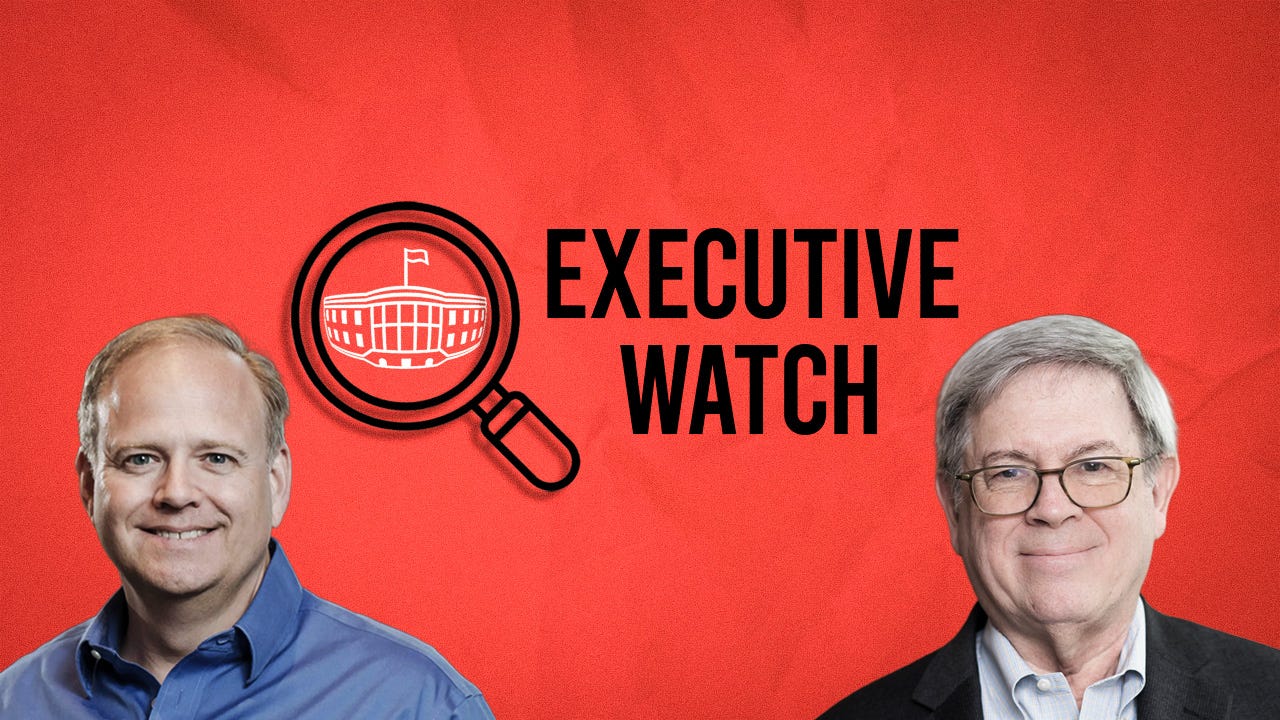Listen to Zooming In at The UnPopulist in your favorite podcast app: Apple Podcasts | Spotify | Google Podcasts | RSS | YouTube
Landry Ayres: Welcome back to Zooming In at The UnPopulist. I’m Landry Ayres.
In a piece for our new project Executive Watch, Walter Olson, senior fellow at the Cato Institute’s Robert A. Levy Center for Constitutional Studies, clarified the dangers of a recent presidential memo from the Trump administration, which accuses prominent law firms of “grossly unethical misconduct” and threatens them with severe penalties—such as revoking security clearances and cutting off federal contracts.
Speaking with the director of Executive Watch, Rob Tracinski, Olson explains how, under the guise of promoting “accountability” for “frivolous, unreasonable, and vexatious litigation,” this move threatens the current means of accountability relied on by judges and undermines the independence of the entire legal profession.
We hope you enjoy.
A transcript of today’s podcast appears below. It has been edited for flow and clarity.
Robert Tracinski: You just did a really good piece in The UnPopulist on the ongoing attacks by the Trump administration on basically the entire legal profession. And I just want to walk through what these attacks are.
It starts with several executive orders targeting specific law firms. Talk about what those punishments—revocation of security clearances, revocation of access to public buildings—are and why they’re so devastating for these big firms.
Walter Olson: We’ll start with the four—or perhaps more—individual spite orders, as I’ve called them, and in a moment we can get to Trump’s rationalization for why these firms were chosen.
Big Law firms intend to serve not only individuals and small businesses but also large corporations, and usually, therefore, have departments dealing with a lot of different things that a big corporate client might need. So, they will typically have some employment lawyers and some tax lawyers, and, in just about all cases, they will do some regulatory practice where they will represent the company at federal agencies of different sorts. The security clearance part comes in most obviously if you’ve got any defense contractors. But also, security clearances wind up being necessary for a much wider range of legal work than you might think for various employment and individual lawsuits, where someone’s employment file includes classified material because they’re in some national security sector, which can even be a thing that doesn’t involve the government, and likewise, in a wide range of disputes—such as contract disputes—between companies in the government, and really lots and lots of other things. If you don’t have a security clearance, then you can’t represent your client in a lot of the ways in which they need to be represented. So that’s one big chunk.
Then the second big chunk, which relates closely to it, is going after government contractors. The most minor part of this is that, in most cases, the law firms themselves didn’t have government contracts; it was their clients who had government contracts. But although each executive order is somewhat different from the others, they typically say that the law firm must not represent the government contractor on the contracted work, or else they will review the contract for possible cutting off of that contractor. And then at least some of them include further language suggesting that a blacklist of government contractors will be developed that use the forbidden law firms even for other work. So, even if they’re using them for local real estate work, or even if they’re using them for other areas of law that don’t have to do with the federal government, they’re still going to identify those firms and call it to the attention of federal officials who review contracts.
So, it’s a review with negative implications. They are cagey about what they say, in part because it helps to insulate them from court review if they don’t say exactly what’s going to happen to you after the Sword of Damocles is arranged in a teetering fashion above your head, but it’s perfectly clear to risk-averse clients that the eyebrow is being raised, not just for exercise of facial muscles, but in order to accomplish certain things, namely, to get clients to abandon the named law firms.
Tracinski: One of the aspects to this that I think is important to mention is that this is a case where the process is the punishment. So, let’s say that you’re one of these named law firms, and you decide, “I’m going to fight this in court.” Some of them are fighting this in court. You might spend six months, a year, fighting this in the courts. But, in the meantime, your risk-averse clients, your big corporations who cannot afford to be punished just for the lawyer they hire, they’re going to leave you. You’re going to be bleeding cash. You’re going to be bleeding money the whole time. This is a very typical way of abusing power—you put somebody through a process where even if they’re vindicated at the end, the punishment has already been meted out just by going through the process.
Olson: Exactly. Each of these firms have had to do a calculation of, “How long can we survive the departure of clients?” And that is possibly augmented by the departure of some lawyers who go off to greener pastures. For Perkins Coie, the best known early name in this, they are the largest firm in Seattle, in the Pacific Northwest. They’ve got all of these tech clients; most of the well-known tech clients are Perkins Coie clients. And, of course, those companies all have massive government contracts for data work and so forth.
So, will it work? Well, we now have an experiment of sorts in which a couple of firms have folded and a somewhat larger number of firms have not folded but instead have, in three cases, gone to court and almost immediately got court orders. I’ve only gone through a couple of the leading punishments. These executive orders, or most of them, purport to forbid the lawyers from entering federal buildings. Now, the most obvious federal building they might want to set foot in is a courthouse. To prevent American citizens from setting foot in federal courthouses is new and unprecedented. If they are to do their jobs, the firms also need to set foot in federal buildings of many other sorts. Perkins Coie, for example, has said that it has, I think, 500 ongoing proceedings on patent law with the U.S. Patent and Trademark Office, which it is suddenly not allowed to send lawyers into if it takes the order seriously. And related to that, it purports to instruct federal employees not to talk to people from those law firms, even if it means going off to a neutral third location.
“If the process is the punishment, then he can wreak a lot of destruction on law firms he dislikes. He can cause a lot of repositioning, particularly in corporate America, which is so risk averse, and get them to move over to law firms that he sees as more willing to play ball with him. And then, even if the dust clears and he’s lost the cases, those firms may never return to what he sees as the liberal law firms they used to be.” — Walter Olson
Already, stories are filtering back quickly about clients of these firms who say that they have been told by federal regulators, “Please find lawyers other than from this firm to represent you in our meeting next week.” And how do courts enforce such a thing? The agency might be dragging its heels on a meeting for several reasons. Is it because a forbidden lawyer is on the list of guests, or is some other reason behind why they keep putting it off week to week? Very hard for a court to police that.
Tracinski: I want to talk about why he’s targeting these particular firms. The first one he went after is a firm that had represented Jack Smith, the prosecutor who was investigating Trump. This is clearly revenge against Smith, saying, basically, “We are going to go after any lawyer who represents this guy.” Trump has indicated he’s going to try to prosecute him in some way. This seems to be a very direct attempt to say, “We’re denying his right to counsel. Any lawyer or any law firm that represents him, we’re going to go after them and we’re going to destroy them so that nobody can represent somebody that is our political opponent.”
Olson: It is so blatant. A different kind of president would have tried to disguise it, put on a wig and false mustache and that sort of thing. Trump comes right out, in each of the first four orders, and says, “Here’s the name of someone who has fought me in court. Perhaps they took a leave of absence to help in one of my prosecutions or something.” And then he’ll throw out a bunch of stuff about, “And they’re so dishonest. They were trying to do lawfare and pursue law for political reasons.” He has no sense of self awareness in these things.
But in many cases, Trump is recycling ethical claims that he made at the time and that courts did not uphold his side on. The courts did not, in fact, find the prosecutor to have violated the law. We already have ways of addressing lawyerly misconduct, all of which involve more of an objective look by impartial people. The least imaginable objective look by impartial people is to ask the opponent whether or not your conduct as a lawyer was unfair. But that’s what Trump puts at the centerpiece: “Yeah, I have a grudge against this person who used to be associated with your law firm.”
Tracinski: One of the other things he’s doing is targeting a law firm that worked on election cases. He lost all these challenges to the 2020 election in court. So, now he’s basically going in to punish the lawyers who successfully argued against him.
But let’s get to the issue of ethical conduct, because that’s the other executive order here. He had the ones you called “spite orders” where he’s targeting specific firms. But then he also has one targeting unethical conduct by creating penalties for unethical conduct by lawyers. Penalties for unethical conduct by lawyers already exists, but he’s trying to take that over as, “The executive will be the sole judge of that.”
Olson: Yeah, and it’s couched as a memo rather than an executive order, but it is the attempt to turn into a general, ongoing presidential power the thing that was done on a retail, case-by-case basis in the executive orders. In it, he rambles on about election law, and I think that’s ominous for reasons that probably don’t require much explanation. In earlier ones, it had been more campaign-related stuff. But going to court to dispute and typically beat him on issues about the actual administration of elections, suits that often occur after the vote has taken place ... he’s really steamed about that. And he also mentions immigration law as an area that, “We think lawyers get away with a lot.” But he doesn’t limit it to those areas. He says, “We will be looking at all conduct in which they opposed the federal government over eight years, in which we consider their behavior vexatious, frivolous, unfounded, baseless.”
“The response of Big Law has just caused a pit in the stomach for people. It’s not as if we were expecting them to be the bravest people in the world, but self-interest is at stake here. Very evidently, these firms themselves, aside from all the principles that they have espoused over the years, or at least that they have spoken over the years, will be less important, less respected, less looked up to as places that people want to go for validation that they are leading lawyers. If Trump gets away with this now, the whole legal profession, of course, stands to lose.” — Walter Olson
Now, I can’t resist pausing for just a moment to say that if there were a dictionary entry for “vexatious litigation,” it might well be illustrated with the visage of Donald J. Trump. My background includes writing several books about abuse of the legal system; that’s how I kind of got my name. My first book started out with a Trump anecdote about how he was at the time New York City’s—which probably means the whole country’s—most visible abuser of the right to file flimsy actions in order to make his opponents suffer or misuse the law in various other ways, such as by telling construction contractors who had perfectly good claims for work that they had already done that they would have to fight as lawyers, and that they should take 20 cents on the dollar instead, and a long, colorful list of other things, defamation suits and so forth. His lack of self-awareness is some sort of superpower; lack of self-awareness indicates that it’s lack of a power, but he has this sort of superpower of projection.
I am the first to concede that there is a problem of lawyers abusing the process, both in litigation against the federal government and in most other categories of litigation. It’s human nature. It’s misuse of powerful tools that can be turned into weapons in litigation. So, the general problem is certainly one to diagnose and work on. The idea of creating remedies only for such behavior against the federal government, and never examining vexatious tactics by federal lawyers, although they are well documented across a wide range of fields ... already we have very little remedy for a lot of those, and sure won’t have a remedy with Trump’s memo.
But beyond that, the chief method for getting at legal misconduct currently in federal courts is what is called Rule 11. It’s one of the Federal Rules of Civil Procedure. And I leave aside for the moment what happens in criminal law, which has its own parallel things, because I have worked longer in civil. But in civil litigation, if you find that your opponents have done something vexatious, you can file a Rule 11 motion. The judge will look at it. The rules are not as pro-discipline or as pro-sanction as I wish they were, and I’ve written at some length about why we would do better if we allow judges a little more extent and flexibility to get a handle on legal misconduct. Nonetheless, they are there. They are set up so that lawyers have a fighting chance of knowing beforehand whether they’re violating Rule 11 or not. In other words, they give reasonably clear notice of what is a violation and what is in the violation. And they also give some predictability of penalties, so that the penalties are proportioned to the damage done to the opponent. If there is no damage done to the opponent, then lesser penalties, and on down the line.
In other words, they reflect the tradition of Western ideas of justice, which is that there should be pre-announced rules of misconduct. There should be an objective finder of fact and finder of law that determines whether you overstep the line. And the penalties, if it comes to penalties, ought to be proportioned and explainable, rather than capricious.
So, what Trump is trying to do is to take over the form of sanctions while undercutting all of the things that keeps them within the realm of actual justice. He is most obviously taking away the role of the judge. And what I find so amazing on this is that there is no concession that he shouldn’t be handing down these orders in cases where he raised the issue and a judge ruled against him, saying that the lawyer’s conduct was not wrong, or in ones where he didn’t bother to raise the issue, because his chances of getting such a ruling were so slender that he wasn’t even going to try it, and he reserves the right to do it eight years later.
Now, statutes of limitation are very important, both for justice and for preventing the world from collapsing into a sinkhole of litigation by people never being willing to ever actually settle anything at present. It’s healthy, even if the opposing lawyers got away with some tricks. If you haven’t raised it in Rule 11 and the case ends, then the judge is not going to let you come back seven years later and say, “I’m still steamed about this. Drag those other lawyers back into court. I want a punishment.” The judge is going to say, “No. The concept of timeliness is especially important for lawyers’ behavior, and you needed to raise it at the time, rather than holding it and nursing it along as a grievance and then springing it on them after they have maybe shredded their files and the lawyers involved have left.” You couldn’t find a more systematic way to undercut the elements of justice that currently apply to sanctioning of misbehaving lawyers.
Tracinski: This is very much an attempt to usurp the power of the courts. Trump’s been complaining about judicial review, basically saying the court shouldn’t be able to pronounce upon or limit in any way what happens in the executive. But he’s now saying, “I should be able to go in and dictate to judges how things are done and what’s able to be done and who’s able to argue in their courtrooms.”
Olson: His contempt for the separation of powers, and for the Constitution generally, knows no bounds. He has come up with ways of attacking the separation of powers that, I have to hand it to him, are novel. As far as I know, no president has attempted to interfere with the free functioning of the judicial branch in this way. There have been some other types of challenges, but it is so obviously at odds with the Anglo-American tradition—and really its much wider tradition of countries that have had free courts—that lawyers are to be left fearless. Because, without fearless lawyers, you are not going to get people to take positions that are unpopular with the king or his court (“court” in the sense of his key advisors and allies and oligarchs).
“People who have claims against the government based on its various actions of the last two months are finding that they can’t get as many firms to look at representing them because of this fear. And sometimes this is a matter of, they won’t do pro-bono work. Sometimes they’ve got the money to pay regular rates, and the firms still won’t take the business because they don’t want to get in trouble with the authorities. So, it’s already happening now. You extend this forward nearly four years more, and assuming that there is a change of government, then four years is enough to make a very, very significant change in people’s willingness to stand up to the government.” — Walter Olson
So, it is audacious in this extraordinary new way, and the courts are being put to a very unpleasant dilemma: On the one hand, they really have to act fast, or else damage will be done that will be very difficult to undo; on the other hand, genuinely novel issues are being pitched at them, and judges understandably don’t want to resolve novel, important issues on the fly—they don’t want to have to come up with something that may make permanent, important constitutional law in a weekend.
So, in this and in the procedural tangles and in other areas where he is trying extraordinarily aggressive moves that vary from existing precedent, you see the courts swarming this way. And we have all turned into more of an expert than we ever were on things like the difference between a temporary restraining order and a preliminary injunction. Who had to know about that before? Now it’s the stuff of daily court news.
The federal courts, I will say, which have almost entirely been the ones to hear this, have acquitted themselves very well. But still that is their dilemma.
Tracinski: One of the things that is almost a service that Donald Trump has done for us is he systematically probed every part of our political system for any weakness in it. He’s probing the 22nd Amendment and finding, “Well, how would you get around the 22nd amendment, if you wanted to run for a third term?” He’s finding every little difference in wording, every little gap, every little chink, everything that was dependent on norms and customs and not on the law. And he’s going through every breach that he finds.
And one of the reasons why he does so many of these things is he knows that maybe 90% of them are going to get thrown out, but he’ll still get those 10% where he can get away with something.
Olson: Yeah, I often say 80%—the courts will stop 80% of it. In some cases, as with the grabbing back of power from independent agencies, the courts had already indicated that they were intending to move in the direction he wants. So, some of those are predictable ones. But the sheer volume ... as someone in Russia said, “quantity is a quality all its own.” So, some of it he’s going to get just because the volume is such that he will occasionally get lucky with judicial selection, or with their not understanding the facts correctly, or various ways in which you can get lucky holding relatively low cards in your hand, in this process.
But the other part is what you talked about earlier, which is that if the process is the punishment, then he can wreak a lot of destruction on law firms he dislikes. He can cause a lot of repositioning, particularly in corporate America, which is so risk averse, and get them to move over to law firms that he sees as more willing to play ball with him. And then, even if the dust clears and he’s lost the cases, those firms may never return to what he sees as the liberal law firms they used to be.
Tracinski: You talk about how this applies to Big Law—these very, very large firms. But there’s also stuff in here that applies to even just smaller firms—and it could be pretty devastating. So, it’s not like, “Okay, I can’t get a Big Law firm. But I can get a small, three-partner firm, to represent me.” There’s stuff that’s going to target them, too.
Olson: Right, and most visible on that is that he instructs his underlings to try to generate bar disciplinary complaints against lawyers and their law firms that he believes have taken wrong positions—“baseless or vexatious”—against him in court. Depending on who the lawyer is, it can be a mosquito nuisance or it can be a serious threat. Lawyers may, as I have speculated, reorganize into boutiques—such an odd word to use to describe a few lawyers who may be trying to keep you out of prison. But they will call themselves a boutique, even if they’re selling you liberty from being imprisoned rather than cute dresses. There may be criminal law boutiques, or boutiques that file administrative law cases against regulatory agencies gone wild, and they may feel sheltered because they are too far from having big companies as clients. But the smaller the law firm, the more it might have to worry about a bunch of themselves, vexatious, complaints to bar authorities.
“His contempt for the separation of powers, and for the Constitution generally, knows no bounds. He has come up with ways of attacking the separation of powers that, I have to hand it to him, are novel. As far as I know, no president has attempted to interfere with the free functioning of the judicial branch in this way. There have been some other types of challenges, but it is so obviously at odds with the Anglo-American tradition—and really its much wider tradition of countries that have had free courts—that lawyers are to be left fearless. Because, without fearless lawyers, you are not going to get people to take positions that are unpopular with the king.” — Walter Olson
Of course, it might also depend on what part of the country you’re in. There are parts of the country where the bar is fairly liberal and going to look at the facts and say, “We saw that you didn’t do anything wrong. Go in peace.” And then there are going to be other parts of the country where the bar is under some influence from MAGA. Those are exactly the sorts of places where potential clients might be in most desperate need of a good lawyer, because they don’t necessarily have local political support; they don’t necessarily have a state government sticking up for them. Those lawyers who deserve our admiration, in many cases, for standing up against what may be the local public opinion are now going to have a new threat both to their livelihood and their good name.
Tracinski: You said that the courts have acquitted themselves well. I saw somebody charted this out and said that in Trump’s first term, there was a general pattern that judges appointed by Republican presidents ruled for Trump more often and judges appointed by Democratic presidents ruled in his favor less often. In his second term, they said, it’s actually been pretty consistent—that same level across each side. So, this isn’t really liberal versus conservative judges; this is the judiciary versus the executive.
Olson: Those are important numbers to look at. And I would also add that in Trump’s first term, there was a difference between cases challenging policies which did have some ideological difference in which the Republican judges were more inclined to uphold executive action, and then cases about the election results themselves in 2020 in which, so far as I know, Trump just uniformly lost, except on one issue, where he actually had a good case and therefore the Republican and Democratic appointed judges came out exactly the same.
What we’re seeing now resembles the post-election litigation, rather than the policy litigation on immigration and other topics that had preceded it over the four years of the Trump 1 term. That’s worth dwelling on a bit. One of the things that scrambles the calculation for some people is so called judge shopping, and it’s something that goes on in administrations of both parties. In Trump 1, liberal challengers to various Trump policies would often go on in Hawaii or San Francisco, where it’s hard to find any conservatives. And you still see that somewhat in Rhode Island and some other places. Some of the important early suits against Trump actions have been filed in jurisdictions that seem unusually likely to have federal judges that will hear them. And then, of course, when Biden took over, it all flipped; the challenges to Biden actions were filed in Amarillo, Texas. We got to be so familiar with Amarillo Texas because there are these single-judge federal judicial districts. So, all of these national policies affecting people from coast to coast were of special interest to people in Amarillo, to the point where all of those cases had to be heard in Amarillo.
Now, to step away from the current madness, this is something that would be worth addressing because it’s a flaw in the system. It means that we’re not getting the kind of randomness in judicial assignment that we would in principle. Since the Supreme Court can’t review everything, it opens up the possibility that the Fifth Circuit, the one that includes Texas and Louisiana, and which is famously the most conservative, is going to get its way on some things. Likewise for the liberal circuits that will go in the opposite direction. So, yes, there is a background problem here.
The fact that the cases get filed by preference before one set of federal courts, depending on what administration it is, can throw the numbers off. It can look as if it’s only Democratic judges in those first few cases in Rhode Island and elsewhere, when, in fact, once the cases began going before Republican judges, if only because of the luck of the draw, you find, the Republican judges agreed with that Rhode Island judge. Bush appointees—both Bush Senior and Bush W.—handed down the last three important decisions knocking Trump back in federal district court in D.C. They just got the cases by the luck of the draw, but they took a look at those cases. They weren’t having it.
My heart has sunk as I’ve seen that both Republicans and Democrats, both liberals and conservatives, have been willing to undercut the legitimacy of the legal system for short term partisan gain. You saw the efforts on the left to pack the court after they were disappointed with Dobbs and a number of other decisions to say that the appointment of the last few conservative justices was illegitimate and should be reversed, or at least outnumbered. I said, “Watch what you’re doing. You may need to call on the legitimacy of the courts sooner than you think. What if someone like Donald Trump gets reelected?” This just largely fell on deaf ears. Not entirely—there was a good article in Vox in which Zack Beauchamp blew the whistle to his own progressive co-thinkers, saying, “You know, once we destroy people’s confidence in the judicial branch of government, we can’t just recreate it at will if it turns out to be necessary in a constitutional crisis.” But voices like his were pretty uncommon.
Tracinski: The final question about these attacks on the law firms, and this attempt to exert control and prevent people from being able to challenge the government: What can be done? Because the lack of resistance has been striking. So, for example, the firm Paul, Weiss made a deal with Trump and caved in. But one thing that struck me is that the top guy at Paul, Weiss had a line in the announcement about how, “Well, we reached out to other Big Law firms to see if they would help us and defend us, and basically they threw us under the bus.” You would think that the Big Law firms would have, between them, armies of lawyers with which to bury the administration. But instead, some have resisted, but some of them have not. So, what could be done?
The president of Rutgers says we need to have a consortium of all the universities getting together to fight this together and put our united power behind it. And somebody described it as an Academic NATO. You attack one of us, you have to attack everybody. Should there be a Big Law NATO, or is it too late for that? What can be done to stop this?
Olson: I wish I had better answers to that. And I wish there were time to go into the example of universities, because I admire the impulse. But I wonder, since their budgets are often answerable to state governments, whether the New Jersey legislature, of which Rutgers is a state university, would actually authorize the expenditure of funds for the defense of other universities in other states. But leaving that aside, the response of Big Law has just caused a pit in the stomach for people. It’s not as if we were expecting them to be the bravest people in the world, but self-interest is at stake here.
Very evidently, these firms themselves, aside from all the principles that they have espoused over the years, or at least that they have spoken over the years, will be less important, less respected, less looked up to as places that people want to go for validation that they are leading lawyers. If Trump gets away with this now, the whole legal profession, of course, stands to lose. It stands to be demoted to the legal profession in semi-autocracies, where getting along with the authorities is more important for lawyers than zealous representation. Lots of bad things lie down that path, but one of them is a diminution of the importance of the legal profession.
Tracinski: Yeah, what’s the point of lawyers when there is no law?
Olson: Yeah, they’re just negotiating plea bargains, in a way, if they’re not allowed to actually try to win for you. Someone looked at the 30 largest Big Law firms and found that none of them, as in zero, had openly expressed support for the four firms that had come under attack. The largest firm that has put out a great statement is Keker, Van Nest & Peters of San Francisco, which is well respected, but is not one of the top 30 firms. So, that unfortunately set the tone. It doesn’t mean that the individual firms have not resisted. Perkins Coie and Jenner & Block and WilmerHale have all declined to cut deals, have gone to court, and gotten temporary restraining orders. They are individually doing the right things, and more credit to them for doing so. But no one is standing up. It’s as if someone decided to re-film the movie Spartacus, except as a farce instead of as a tragedy, and instead of the prisoners saying, “I am Spartacus” ... they begin sidling away in a mousy way, saying, “I’m not Spartacus.”
Tracinski: “He’s Spartacus. Not me!”
Olson: Yeah—farcical and yet terribly depressing for the survival of a free republic.
Tracinski: I guess the grim question then is: What happens if they get away with this? What happens if this goes forward and this is not stopped in some significant way?
Olson: I think it won’t take long at all. Indeed, it’s already happening for the universe of lawyers available to clients to begin changing already. People who have claims against the government based on its various actions of the last two months are finding that they can’t get as many firms to look at representing them because of this fear. And sometimes this is a matter of, they won’t do pro-bono work. Sometimes they’ve got the money to pay regular rates, and the firms still won’t take the business because they don’t want to get in trouble with the authorities. So, it’s already happening now. You extend this forward nearly four years more, and assuming that there is a change of government, then four years is enough to make a very, very significant change in people’s willingness to stand up to the government. If you can’t find good lawyers in your community, if you can’t find good lawyers who have the specialty in the subject matter, then at that point, your options may be much less attractive.
I’ve been praising the courts. Courts can’t really do anything unless people are willing to fight cases and bring the dispute before them as a case or controversy. They can’t give advisory opinions. They have to hold their power for when someone has had the courage to stand up, and it’s thought phase that we’re at risk of losing.
Tracinski: I wish I could do happier, more positive, more optimistic endings to these podcasts these days.
Olson: In a few weeks, we will know whether the Supreme Court is inclined to stand up to this, and if so, whether the administration finally backs off some of it, or we head into a you know what. But check back. A week ago, we wouldn’t have had three temporary restraining orders against this. So, that’s one way in which I’m more optimistic than I was a week ago.
© The UnPopulist, 2025
Follow us on Bluesky, Threads, YouTube, TikTok, Facebook, Instagram, and X.
We welcome your reactions and replies. Please adhere to our comments policy.


















